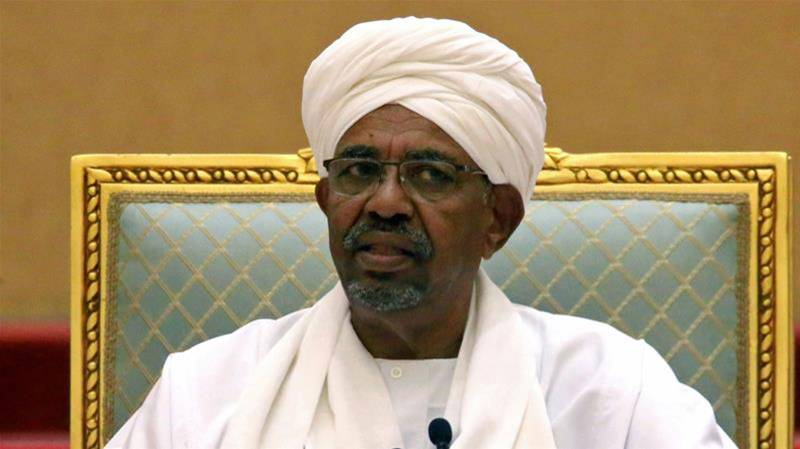KHARTOUM - Sudan’s deposed President Omar al-Bashir has been moved to Kober prison in the capital, Khartoum, family sources told Reuters news agency, but officials disputed the account. Citing a source at the prison on Wednesday, Reuters reported that al-Bashir was being held under tight security in solitary confinement since Tuesday. The ruling Transitional Military Council has yet to confirm the report.
Al Jazeera’a Hiba Morgan, reporting from Khartoum, said officials disputed the report that al-Bashir was being held in the prison. “They said al-Bashir was being held in a safe place under house arrest until he is taken to court,” Morgan reported.
“The protesters who are conducting a sit-in at the defence ministry in the capital say that they will not end their action until they see al-Bashir in court to be held to account for crimes committed when in power,” she added. “They’re also saying they will not end their sit-in if the government does not hand over power to an independent civilian government.”
Witnesses said there was a heavy deployment of soldiers and members of the paramilitary Rapid Support Force outside the Kober prison in north Khartoum. “There are troops in vehicles mounted with machine-guns near the prison,” a witness told a private news agency. Kober prison was built by the British during the colonial period and is located on the east bank of the Blue Nile in a northern district of the capital where al-Bashir grew up.
The area was previously known as Kober, taking its name from the prison, but al-Bashir later changed the name to Omar al-Mukhtar after a hero of Libya’s struggle against Italian colonial rule. The brick-built prison, which is surrounded by a high concrete wall, holds hundreds of inmates at any one time, many of them crammed in tiny cells.
It has a special wing for political prisoners where several opposition leaders and activists were held during the four months of protests which led to al-Bashir’s overthrow. The wing is run by the feared National Intelligence and Security Service rather than the police.
Since his removal by the military last Thursday, al-Bashir had been detained under heavy guard in the presidential residence inside the compound that also houses the defence ministry, the family sources said. The military removed al-Bashir after months of protests against him that culminated in a sit-in outside the defence ministry compound that began on April 6. Protesters are still camping there demanding the end of ‘deep-state’. Al-Bashir, who ruled Sudan since 1989, is facing arrest warrants by the International Criminal Court (ICC) for war crimes and crimes against humanity in connection with the conflict in the western Darfur region. Meanwhile, Uganda said on Wednesday it would consider offering asylum to al-Bashir despite his indictment by the ICC. “Uganda would not be apologetic at all for considering an application by al-Bashir,” Okello Oryem, Uganda’s state minister for foreign affairs, told Reuters. Oryem said al-Bashir had yet to contact Kampala for possible refuge, but added that there was no harm in considering the fallen Sudanese leader for political asylum.
There was no immediate comment from the ICC in The Hague. ICC member states, which include Uganda, are obligated to hand over indictees who enter their territory.
Though al-Bashir is under ICC indictment for suspected genocide in Darfur, the military council in Khartoum has said it will not hand him over and instead may try him in Sudan.
Ugandan President Yoweri Museveni has in the past criticised the ICC, describing it as a tool of Western justice against Africans, and he once vowed to mobilise African countries to pull out of the court’s founding treaty.
Relations between Sudan and Uganda, where Museveni has been in power since 1986, were frosty in the 1990s and early 2000s.
Uganda accused al-Bashir-led Sudan at the time of supporting strongman Joseph Kony’s Lord’s Resistance Army (LRA), while Sudan alleged Uganda was offering assistance to an anti-Khartoum rebel group, the Sudan People’s Liberation Army (SPLA). The SPLA later led South Sudan to independence from Khartoum while the LRA, still undefeated but mostly dormant, is believed to be hiding out in a patch of jungle between the borders of Uganda, South Sudan and the Democratic Republic of the Congo.
After South Sudan’s independence in 2011, Museveni and al-Bashir gradually reconciled and have since jointly championed efforts to end fighting in the newest African country.
Meanwhile, Sudan’s military council ordered the central bank to review financial transfers since April 1 and to seize “suspect” funds, state news agency SUNA reported on Wednesday.
The TMC also ordered the “suspension of the transfer of ownership of any shares until further notice and for any large or suspect transfers of shares or companies to be reported” to authorities.






